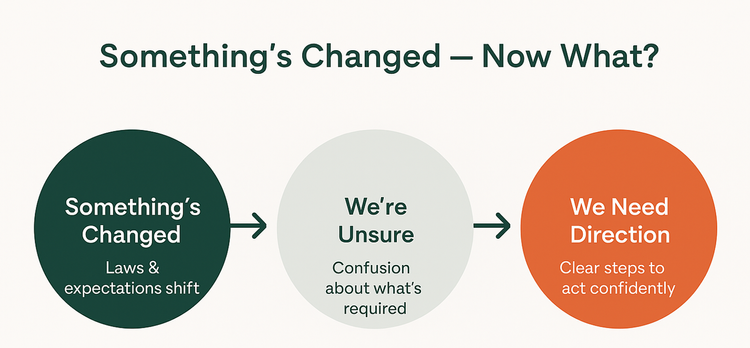Something’s Changed…Now What?
If you’ve recently found yourself thinking, “We probably need to do something about these new psychosocial risk rules…” - you’re not alone.
Across industries, organisations are realising that the landscape has shifted. Regulators are no longer focused on education, they’re enforcing. And when enforcement steps up, uncertainty does too.
That’s where many businesses get stuck:
They know something’s changed, but they’re not sure what to do next.
Most organisations get stuck in the middle, unsure of what’s required or where to start. Risk Collective helps bridge the gap from uncertainty to confident action.
What’s Happening
Regulators are now treating psychosocial risks with the same seriousness as physical ones.
WorkSafe ACT
They’ve issued prohibition notices, where inspectors found a serious or imminent risk to mental health. One case involved a home visit healthcare service where repeated traumatic incidents occurred without proper controls in place.
Their psychosocial team completed 120 workplace visits last year, issuing 225 improvement notices, two prohibition notices, and nine fines totalling $33,800.
The regulator’s message was clear: too many businesses haven’t properly consulted with their workers or identified psychosocial hazards, and that’s no longer acceptable.
SafeWork NSW has also stepped up.
It issued a prohibition notice to UTS, halting a redundancy process because of the psychological harm risks to staff, and an improvement notice to Macquarie University, requiring genuine consultation before proceeding with major restructures.
Why It Matters
Restructures. Rapid growth. Leadership turnover. High workloads. Poor role clarity. Whenever these things happen, uncertainty follows, and with it, psychosocial risk.
When people don’t understand what’s happening, feel excluded from decisions, or are stretched too thin, you start to see stress, disengagement, conflict, and burnout creep in.
That’s why regulators expect businesses to apply the same structured approach to psychosocial hazards as they do for physical ones:
Identify what could cause harm
Assess who could be affected and how
Put controls in place
Review and communicate the outcomes
It’s not about overcomplicating things; it’s about being proactive and transparent.
Where Risk Collective Comes In
At Risk Collective, we take the legal noise and turn it into clear, practical steps that make sense for your business.
We help teams:
Map out where psychosocial risks might exist (especially during times of change)
Build consultation processes that actually work
Identify and close compliance gaps before regulators do
Give leaders confidence to act, not react
Because when something changes, you shouldn’t have to scramble. You just need a clear, confident plan.

